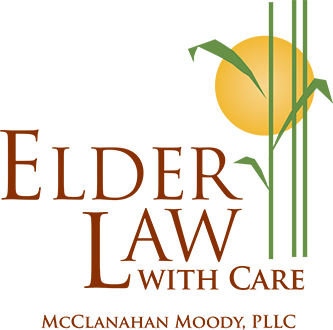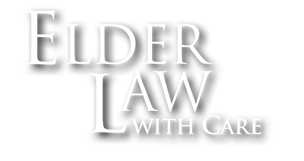
Dedicated to the Interests of the Elderly
Frequently Asked Questions About Senior Care Assistance
How do I get my Mom/Dad on Medicaid?
Medicaid is a long term care assistance program that is funded by the Federal and State government. There are complicated eligibility rules.
When a person is suffering from a chronic illness it is important to carefully analyze their needs for long term care and how the cost of that care will be paid. Everyone’s situation is unique. A person’s ability to function, their income, assets, and marital status all make a difference in Medicaid eligibility.
Be sure to speak with a social worker, DSHS caseworker or an attorney who is familiar with the rules before making a Medicaid application.
How do we avoid probate?
Washington has one of the easiest, most cost effective probate law procedures in the country. It is not a process to be feared in Washington, and can actually provide some worthwhile benefits.
The necessity for a probate is dependent upon the nature of the decedent’s assets at the time of his or her death. A probate alternative may be available if all the decedent’s assets transfer by joint tenancy with right of survivorship or a direct beneficiary designation; or the value of the gross estate is less than $100,000.00.
My Dad has dementia and cannot live at home alone anymore. What should we do?
Even though a person suffers from dementia, he or she may still possess the capacity to sign legal documents. A valid General Durable Power of Attorney is critical for someone with a chronic disease such as dementia.
A decision maker must be in place to assist an ill loved one at this overwhelming and confusing time. There are many resources and services available to help someone remain in their home if that is their desire and the added help can keep him or her safe. There are also many residential settings that can provide the needed level of care.
This is a situation that is best handled with a dementia care plan, one step at a time with the help of the ill person’s doctor, an attorney and family members.
When does a person need a guardianship?
When a person has not executed the necessary legal documents to designate a decision maker and can no longer make decisions for him or herself, a guardianship is often an appropriate and necessary step. It is sometimes also necessary when a Power of Attorney does not adequately keep a person safe.
Guardianship is the most restrictive option because a person can lose a number of or all of their rights as the result of a guardianship. Courts will first look to any available lesser restrictive alternative, such as a Power of Attorney or a Representative Payee. Guardianship is the last resort when an individual is putting him or herself in danger of personal or financial harm.
How long does the guardianship process take?
Someone has to file a Petition for Guardianship in Superior Court. A Guardian ad Litem is appointed to investigate whether or not a guardianship is needed, what kind of guardianship should be put into place, and who should serve as the Guardian. The Guardian ad Litem has 45 days to submit a written report to the Court. The Court then rules on the Petition for Guardianship. A great deal of weight is given to the Guardian ad Litem’s recommendation.
At Elder Law with Care we represent petitioners, alleged incapacitated persons, and guardians.
Does a person who files a Petition for Guardianship have to be the Guardian?
No. The Petitioner is just getting the process started. Other than oneself, the Petitioner can propose that a certain family member, a non-family member, or a Certified Professional Guardian serve as the Guardian. The Court will have the final decision, however, and will base that decision on both the Petition and the recommendation of the Guardian ad Litem.
What is the difference between a Guardian ad Litem and a Guardian?
A Guardian ad Litem is a person who is appointed by the Court after a Petition for Guardianship is filed. Their role is to investigate whether a guardianship is necessary and who is the most appropriate person to serve as the Guardian.
The Guardian ad Litem is a trained person whose name appears on the Court registry. The Guardian ad Litem is typically discharged at the time the Court rules on the Petition.
The Guardian is the person who is appointed by the Court to become the incapacitated person’s decision maker. The Guardian’s duties are set out in the court order that appoints them as well as by the statutes of the State of Washington.
Can I leave an inheritance to my disabled child?
Yes, but you will want to include a special provision in your Will called a Special Needs Trust.
If distributions from your estate go to a Special Needs Trust for your disabled child, the child will be able to continue to receive public benefits. The assets held by a Special Needs Trust are exempt but cannot be distributed directly to the disabled child. They are used for anything to enhance his or her life that public benefits do not cover.
The Trustee of the Special Needs Trust is responsible for making sure that the trust is managed according to the rules to assure that the child’s benefits are not affected.
Isn't it better to have a Revocable Living Trust than a Will?
In some states it is better to have a Revocable Living Trust as an alternative to a Will.
In Washington, however, a Revocable Living Trust is not necessary unless a person has a complicated estate, owns businesses, and/or owns real property outside the State of Washington. While a Revocable Living Trust does avoid probate, the costs of establishing and maintaining such a trust are usually higher than a simple probate proceeding in the State of Washington.
An attorney can guide you in this choice based on your assets and your desired estate plan.
How can I help my parents when I live in another town or state?
If relocation is not an option, there are several things we help put into place to assist families. We have access to top notch care managers and professional financial managers and trustees.
With the use of modern technology, we can assist with securing Powers of Attorney or filing guardianships, accessing public benefits, protecting at-risk vulnerable adults, and finding necessary miscellaneous resources.
How do we pay for long term care for my Mom?
There are three ways to finance long term care: 1) Long Term Care Insurance; 2) Private wealth; and 3) Public benefits.
Because of the complicated eligibility rules associated with public benefits, it is important to meet with a DSHS caseworker and/or an attorney to analyze the options available.
What is the difference between Medicare and Medicaid?
Medicare is a federally funded entitlement program with established eligibility requirements that do not include a resource. It provides various components of healthcare coverage for individuals who have reached the age of 65.
Medicaid is an entitlement program funded by both the federal and state governments and includes financial eligibility limits. Medicaid pays primarily for long term care for individuals who are eligible.
What is a POLST?
A Physician’s Orders for Life Sustaining Treatment is a document you fill out with your physician. It sets out your wishes for end of life treatment in the event you are in a terminal condition. It is signed by you and your doctor and remains with your medical records.
Do I need a Living Will?
A Living Will, or Healthcare Directive as it is called in Washington, is a document that is based on a statute. It is a document in which you make choices about end of life matters such as whether or not you want artificially provided nutrition or hydration, and whether or not you want sufficient pain medication, even if it hastens the moment of your death.
This document is only considered if you are in a terminal condition. Unlike a Power of Attorney where you designate someone to make decisions for you, the Healthcare Directive states the choices you have already made but cannot articulate at time.
What if I file for a guardianship for my Dad and he doesn't want it?
Washington law requires that your Dad is served with the Petition for Guardianship and other documents. He is informed that he has the right to contest the guardianship, he has the right to an attorney, and he has the right to a trial, even a jury trial.
If he wants an attorney, the Court will appoint one for him. It can be an attorney of his choice, or one that is chosen by the Guardian ad Litem. It is the Guardian ad Litem’s job to determine what is in his best interest and it is attorney’s job to advocate for what he wants.
Are Powers of Attorney effective as soon as they are signed?
There are two ways a Power of Attorney becomes effective. It is either effective immediately upon signature, or it is “springing,” which means that it is effective only upon the disability or incapacity of the principal. A “springing” Power of Attorney requires a writing by a physician stating the disability or incapacity of the principal.
Can my Mom just transfer all her money to the kids to qualify for Medicaid?
When considering the Medicaid eligibility of an applicant, DSHS will look at all transfers made by the applicant in the previous 60 months.
If transfers are made to someone not allowed to receive them, a penalty period of ineligibility is assessed. It is important to consult with a DSHS caseworker or an attorney knowledgeable about the Medicaid rules prior to any transfers.
Are both spouses' resources considered when an ill spouse applies for Medicaid?
Yes, all of the separate and community assets of both spouses are considered when Medicaid is looking at available resources of an application.
They only consider the resources of the couple at the time of application. Once the ill spouse is eligible, any additional resources acquired by the well spouse are not considered.
Can the person I named in my Power of Attorney make decisions about my funeral after I die?
No. In Washington, your Power of Attorney stops operating at your death. The person you name as your attorney-in-fact has no authority to make any decisions for you after you die.
Can the State take my Mom's home if she goes on Medicaid?
A home is an exempt resource in terms of Medicaid eligibility, as long as the ill person intends to return to the home. All that is needed is the intention, even if a return home is not a realistic scenario.
It is important to keep in mind that once someone begins receiving Medicaid benefits, the amount paid by the State of Washington for those benefits will accrue and can be placed as a lien upon the home when the ill person dies.
Specific rules apply if the home is occupied by a surviving spouse or a disabled child. Certain rules also apply regarding the transfer of a home to certain individuals prior to a Medicaid application. It is important to consult with a DSHS case worker or an attorney knowledgeable about the rules prior to any transfer or Medicaid application.

Helping Families with Elder Law Services since 2008

Elder Law With Care
McClanahan Moody, PLLC
Phone: (360) 786-5035
Fax: (360) 786-5034
Address: 1700 Cooper Point Rd Bldg A-3, Olympia, WA 98502
Email: info@elderlawwithcare.com
We will guide you and your family through the legal challenges of aging.
We are members of . . .

Dedicated to the Interests of the Elderly

Frequently Asked Questions About Senior Care Assistance
How do I get my Mom/Dad on Medicaid?
Medicaid is a long term care assistance program that is funded by the Federal and State government. There are complicated eligibility rules.
When a person is suffering from a chronic illness it is important to carefully analyze their needs for long term care and how the cost of that care will be paid. Everyone’s situation is unique. A person’s ability to function, their income, assets, and marital status all make a difference in Medicaid eligibility.
Be sure to speak with a social worker, DSHS caseworker or an attorney who is familiar with the rules before making a Medicaid application.
How do we avoid probate?
Washington has one of the easiest, most cost effective probate law procedures in the country. It is not a process to be feared in Washington, and can actually provide some worthwhile benefits.
The necessity for a probate is dependent upon the nature of the decedent’s assets at the time of his or her death. A probate alternative may be available if all the decedent’s assets transfer by joint tenancy with right of survivorship or a direct beneficiary designation; or the value of the gross estate is less than $100,000.00.
My Dad has dementia and cannot live at home alone anymore. What should we do?
Even though a person suffers from dementia, he or she may still possess the capacity to sign legal documents. A valid General Durable Power of Attorney is critical for someone with a chronic disease such as dementia.
A decision maker must be in place to assist an ill loved one at this overwhelming and confusing time. There are many resources and services available to help someone remain in their home if that is their desire and the added help can keep him or her safe. There are also many residential settings that can provide the needed level of care.
This is a situation that is best handled with a dementia care plan, one step at a time with the help of the ill person’s doctor, an attorney and family members.
When does a person need a guardianship?
When a person has not executed the necessary legal documents to designate a decision maker and can no longer make decisions for him or herself, a guardianship is often an appropriate and necessary step. It is sometimes also necessary when a Power of Attorney does not adequately keep a person safe.
Guardianship is the most restrictive option because a person can lose a number of or all of their rights as the result of a guardianship. Courts will first look to any available lesser restrictive alternative, such as a Power of Attorney or a Representative Payee. Guardianship is the last resort when an individual is putting him or herself in danger of personal or financial harm.
How long does the guardianship process take?
Someone has to file a Petition for Guardianship in Superior Court. A Guardian ad Litem is appointed to investigate whether or not a guardianship is needed, what kind of guardianship should be put into place, and who should serve as the Guardian. The Guardian ad Litem has 45 days to submit a written report to the Court. The Court then rules on the Petition for Guardianship. A great deal of weight is given to the Guardian ad Litem’s recommendation.
At Elder Law with Care we represent petitioners, alleged incapacitated persons, and guardians.
Does a person who files a Petition for Guardianship have to be the Guardian?
No. The Petitioner is just getting the process started. Other than oneself, the Petitioner can propose that a certain family member, a non-family member, or a Certified Professional Guardian serve as the Guardian. The Court will have the final decision, however, and will base that decision on both the Petition and the recommendation of the Guardian ad Litem.
What is the difference between a Guardian ad Litem and a Guardian?
A Guardian ad Litem is a person who is appointed by the Court after a Petition for Guardianship is filed. Their role is to investigate whether a guardianship is necessary and who is the most appropriate person to serve as the Guardian.
The Guardian ad Litem is a trained person whose name appears on the Court registry. The Guardian ad Litem is typically discharged at the time the Court rules on the Petition.
The Guardian is the person who is appointed by the Court to become the incapacitated person’s decision maker. The Guardian’s duties are set out in the court order that appoints them as well as by the statutes of the State of Washington.
Can I leave an inheritance to my disabled child?
Yes, but you will want to include a special provision in your Will called a Special Needs Trust.
If distributions from your estate go to a Special Needs Trust for your disabled child, the child will be able to continue to receive public benefits. The assets held by a Special Needs Trust are exempt but cannot be distributed directly to the disabled child. They are used for anything to enhance his or her life that public benefits do not cover.
The Trustee of the Special Needs Trust is responsible for making sure that the trust is managed according to the rules to assure that the child’s benefits are not affected.
Isn't it better to have a Revocable Living Trust than a Will?
In some states it is better to have a Revocable Living Trust as an alternative to a Will.
In Washington, however, a Revocable Living Trust is not necessary unless a person has a complicated estate, owns businesses, and/or owns real property outside the State of Washington. While a Revocable Living Trust does avoid probate, the costs of establishing and maintaining such a trust are usually higher than a simple probate proceeding in the State of Washington.
An attorney can guide you in this choice based on your assets and your desired estate plan.
How can I help my parents when I live in another town or state?
If relocation is not an option, there are several things we help put into place to assist families. We have access to top notch care managers and professional financial managers and trustees.
With the use of modern technology, we can assist with securing Powers of Attorney or filing guardianships, accessing public benefits, protecting at-risk vulnerable adults, and finding necessary miscellaneous resources.
How do we pay for long term care for my Mom?
There are three ways to finance long term care: 1) Long Term Care Insurance; 2) Private wealth; and 3) Public benefits.
Because of the complicated eligibility rules associated with public benefits, it is important to meet with a DSHS caseworker and/or an attorney to analyze the options available.
What is the difference between Medicare and Medicaid?
Medicare is a federally funded entitlement program with established eligibility requirements that do not include a resource. It provides various components of healthcare coverage for individuals who have reached the age of 65. Medicaid is an entitlement program funded by both the federal and state governments and includes financial eligibility limits. Medicaid pays primarily for long term care for individuals who are eligible.
What is a POLST?
A Physician’s Orders for Life Sustaining Treatment is a document you fill out with your physician. It sets out your wishes for end of life treatment in the event you are in a terminal condition. It is signed by you and your doctor and remains with your medical records.
Do I need a Living Will?
A Living Will, or Healthcare Directive as it is called in Washington, is a document that is based on a statute. It is a document in which you make choices about end of life matters such as whether or not you want artificially provided nutrition or hydration, and whether or not you want sufficient pain medication, even if it hastens the moment of your death.
This document is only considered if you are in a terminal condition. Unlike a Power of Attorney where you designate someone to make decisions for you, the Healthcare Directive states the choices you have already made but cannot articulate at time.
What if I file for a guardianship for my Dad and he doesn't want it?
Washington law requires that your Dad is served with the Petition for Guardianship and other documents. He is informed that he has the right to contest the guardianship, he has the right to an attorney, and he has the right to a trial, even a jury trial.
If he wants an attorney, the Court will appoint one for him. It can be an attorney of his choice, or one that is chosen by the Guardian ad Litem. It is the Guardian ad Litem’s job to determine what is in his best interest and it is attorney’s job to advocate for what he wants.
Are Powers of Attorney effective as soon as they are signed?
There are two ways a Power of Attorney becomes effective. It is either effective immediately upon signature, or it is “springing,” which means that it is effective only upon the disability or incapacity of the principal. A “springing” Power of Attorney requires a writing by a physician stating the disability or incapacity of the principal.
Can my Mom just transfer all her money to the kids to qualify for Medicaid?
When considering the Medicaid eligibility of an applicant, DSHS will look at all transfers made by the applicant in the previous 60 months.
If transfers are made to someone not allowed to receive them, a penalty period of ineligibility is assessed. It is important to consult with a DSHS caseworker or an attorney knowledgeable about the Medicaid rules prior to any transfers.
Are both spouses' resources considered when an ill spouse applies for Medicaid?
Yes, all of the separate and community assets of both spouses are considered when Medicaid is looking at available resources of an application.
They only consider the resources of the couple at the time of application. Once the ill spouse is eligible, any additional resources acquired by the well spouse are not considered.
Can the person I named in my Power of Attorney make decisions about my funeral after I die?
No. In Washington, your Power of Attorney stops operating at your death. The person you name as your attorney-in-fact has no authority to make any decisions for you after you die.
Can the State take my Mom's home if she goes on Medicaid?
A home is an exempt resource in terms of Medicaid eligibility, as long as the ill person intends to return to the home. All that is needed is the intention, even if a return home is not a realistic scenario.
It is important to keep in mind that once someone begins receiving Medicaid benefits, the amount paid by the State of Washington for those benefits will accrue and can be placed as a lien upon the home when the ill person dies.
Specific rules apply if the home is occupied by a surviving spouse or a disabled child. Certain rules also apply regarding the transfer of a home to certain individuals prior to a Medicaid application. It is important to consult with a DSHS case worker or an attorney knowledgeable about the rules prior to any transfer or Medicaid application.

Elder Law With Care
McClanahan Moody, PLLC
Phone: (360) 786-5035
Fax: (360) 786-5034
Address: 1700 Cooper Point Rd Bldg A-3, Olympia, WA 98502
Email: info@elderlawwithcare.com


